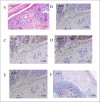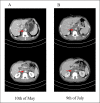MLH1 Exon 12 Gene Deletion Leading to Lynch Syndrome: A Case Report
- PMID: 34091457
- PMCID: PMC8495764
- DOI: 10.1159/000516659
MLH1 Exon 12 Gene Deletion Leading to Lynch Syndrome: A Case Report
Abstract
Introduction: Deleterious heterozygous mutation of the MLH1 gene is an important cause of Lynch syndrome (LS), an autosomal dominant cancer caused by functional defects in the DNA mismatch repair (MMR) complex.
Case report: The proband was a 35-year-old patient with confirmed colorectal cancer (CRC). Immunohistochemical (IHC) staining revealed the absence of MLH1 and PMS2 expression in the colorectal tissue specimens of the patient. Genetic counselling and tumor gene testing were performed using next-generation sequencing technology. The genetic tumor verification report showed the deletion of 4 bases in exon 12 of the tested MLH1 gene and a transcoding mutation. To our knowledge, this germline splice site mutation of MLH1 has not been reported before. The proband accepted several therapeutic regimens including PD-1 inhibitor and ultimately died of multiple organ failure.
Conclusion: Nonsense mutations and frameshift mutations of MMR genes are the most common causes of LS. Common mutations include those in MSH2, MLH1, MSH6, and PMS2. We report a mutation of MLH1 that has never been reported before. We recommend that patients with a history of colon or rectal cancer receive universal MMR or MSI testing and checkpoint inhibitor therapy for the first-line treatment of deficient MMR CRC.
Keywords: Colorectal cancer; Germline mutation; Lynch syndrome; Mismatch repair; PD-1 inhibitors.
© 2021 The Author(s) Published by S. Karger AG, Basel.
Conflict of interest statement
The authors have no conflict of interests to declare.
Figures





Similar articles
-
Mismatch repair gene mutation spectrum in the Swedish Lynch syndrome population.Oncol Rep. 2016 Nov;36(5):2823-2835. doi: 10.3892/or.2016.5060. Epub 2016 Sep 1. Oncol Rep. 2016. PMID: 27601186
-
[Genetic analysis of 45 patients with suspected Lynch syndrome using next-generation sequencing].Zhonghua Zhong Liu Za Zhi. 2021 Aug 23;43(8):843-849. doi: 10.3760/cma.j.cn112152-20190717-00441. Zhonghua Zhong Liu Za Zhi. 2021. PMID: 34407589 Chinese.
-
Lessons learnt from implementation of a Lynch syndrome screening program for patients with gynaecological malignancy.Pathology. 2017 Aug;49(5):457-464. doi: 10.1016/j.pathol.2017.05.004. Epub 2017 Jun 30. Pathology. 2017. PMID: 28669579
-
The Clinical Outcomes Among Patients Under 60 Years Old with Lynch Syndrome: Variations Based on Different Mutation Patterns.Int J Mol Sci. 2025 Apr 4;26(7):3383. doi: 10.3390/ijms26073383. Int J Mol Sci. 2025. PMID: 40244260 Free PMC article. Review.
-
Mismatch repair deficiency testing in clinical practice.Expert Rev Mol Diagn. 2016;16(5):591-604. doi: 10.1586/14737159.2016.1156533. Epub 2016 Mar 10. Expert Rev Mol Diagn. 2016. PMID: 26895074 Review.
Cited by
-
PD-1 inhibitor in combination with fruquintinib therapy for initial unresectable colorectal cancer: A case report.World J Clin Cases. 2022 May 16;10(14):4669-4675. doi: 10.12998/wjcc.v10.i14.4669. World J Clin Cases. 2022. PMID: 35663084 Free PMC article.
-
Lynch Syndrome and MSI-H Cancers: From Mechanisms to "Off-The-Shelf" Cancer Vaccines.Front Immunol. 2021 Sep 24;12:757804. doi: 10.3389/fimmu.2021.757804. eCollection 2021. Front Immunol. 2021. PMID: 34630437 Free PMC article. Review.
References
-
- Smith RA, Manassaram-Baptiste D, Brooks D, Cokkinides V, Doroshenk M, Saslow D, et al. Cancer screening in the United States, 2014: a review of current American Cancer Society guidelines and current issues in cancer screening. CA Cancer J Clin. 2014 Jan-Feb;64((1)):30–51. - PubMed
-
- Kwak EL, Chung DC. Hereditary colorectal cancer syndromes: an overview. Clin Colorectal Cancer. 2007 Jan;6((5)):340–4. - PubMed
-
- Truninger K, Menigatti M, Luz J, Russell A, Haider R, Gebbers JO, et al. Immunohistochemical analysis reveals high frequency of PMS2 defects in colorectal cancer. Gastroenterology. 2005 May;128((5)):1160–71. - PubMed
Publication types
MeSH terms
Substances
LinkOut - more resources
Full Text Sources
Miscellaneous

